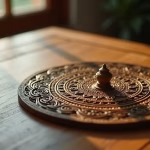Building a Spiritual Routine

In our fast-paced world, finding time for personal growth and reflection can often feel overwhelming.
Building a Spiritual Routine. Yet, establishing a spiritual routine is essential for self-discovery and inner peace. It is like having a lighthouse guiding you through stormy seas when life gets unpredictable. A commitment to consistent spiritual practices can lead to remarkable changes in your quality of life. This blog post will explore the significance of a spiritual routine and share actionable tips to incorporate into your daily life.
The Importance of a Spiritual Routine
A spiritual routine is a set of regular practices designed to nurture your spirit and deepen your connection with yourself and, for many, a higher power. These practices may include meditation, prayer, or reflective reading. Committing to a routine can provide several benefits, such as:
- Enhanced Self-Awareness: A consistent practice of introspection like journaling can improve your understanding of your thoughts and emotions, leading to alignment with your core values.
- Reduced Stress and Anxiety: Engaging in meditation can lower cortisol levels by up to 30%, promoting a healthier stress response.
- Improved Emotional Well-Being: Regular spiritual practices can increase feelings of euphoria. A Study by the University of California found that spiritual dedication leads to a 25% improvement in overall happiness.
- Greater Resilience: A reliable spiritual routine fosters mental toughness. Individuals who meditate regularly reported a 50% increase in resilience when facing challenges.
By intentionally dedicating time to spiritual practices, you may harness these benefits and enhance your overall quality of life.
Identifying Your Spiritual Needs
Before you set out to create your routine, it is vital to reflect on your spiritual needs and what resonates with you. Consider the following questions:
- What beliefs and values define me?
- Which practices feel fulfilling and invigorating?
- What does a fruitful spiritual life look like for me?
Setting aside time for quiet contemplation can illuminate what spirituality means personally to you.
Components of a Spiritual Routine
To craft a routine that suits you, consider the following elements:
1. Mindfulness and Meditation
Mindfulness boosts self-awareness and keeps you grounded in the present. Even if it is just five minutes a day, setting aside time for meditation can be incredibly beneficial. Research indicates that just 10 minutes of daily meditation can improve focus and decrease anxiety over time.
2. Journaling
Use journaling as a tool for deeper self-reflection. Spend a few minutes writing about your thoughts or expressing gratitude for your day. A study from the American Psychological Association suggests that journaling can enhance emotional intelligence by 40%.
3. Reading Spiritual Literature
Dive into spiritual texts or self-help books that resonate with your experiences. Incorporating reading into your routine not only expands your perspective but also offers insights that can guide your spiritual journey.
4. Nature Connection
Connecting with nature can revitalize your spirit. Spend time outdoors by hiking, gardening, or walking in a park. A study from the University of Utah revealed that hiking in nature reduces mental fatigue by up to 50%, helping improve clarity and focus.
5. Rituals and Ceremonies
Creating personal rituals, such as lighting candles or celebrating special days, can ground your spiritual practice. These rituals strengthen your commitment and serve as anchors in your spiritual journey.
6. Community Engagement
Joining a community of like-minded individuals can elevate your spiritual experience. Seek out groups or workshops that focus on spiritual discussions. The support and sharing can lead to deeper connections and insights.
Creating Your Routine
Once you have reflected on your spiritual needs and identified components to include, it is time to design your routine. Here are some actionable steps to help you begin:
1. Start Small
Begin with simple, manageable practices. If meditation feels daunting, commit to just a few minutes each day. Gradually increase this time as you become more comfortable.
2. Schedule Your Practices
Integrate your spiritual practices into your calendar, treating these times as sacred appointments. For instance, allocate 10 minutes in the morning for mindfulness before your day starts.
3. Be Flexible
While establishing a routine is vital, flexibility is equally important. Some days may challenge your ability to stick to your plan. Allow yourself the freedom to adjust without guilt.
4. Track Your Progress
Keeping track of your spiritual practices can boost motivation. Use a physical journal or an app to record how you feel before and after your practices. This will help reinforce the positive impact of your commitment.
5. Reflect and Adjust
Every few weeks, evaluate your routine. Reflect on what aspects are nourishing and satisfying, and make changes as necessary. Your spiritual journey is not static and deserves to evolve with you.
Overcoming Common Challenges
Establishing a spiritual routine may present various obstacles. Here are some common challenges and suggestions to overcome them:
1. Time Constraints
Many find it hard to carve out time for spiritual practices. Try integrating small moments throughout your day. For example, practice mindfulness on your commute or use bedtime for reflective journaling.
2. Loss of Motivation
It is normal for enthusiasm to wane at times. Remind yourself of the benefits of your practices. If you feel stuck, switch things up by exploring new practices or different settings.
3. Comparison with Others
In an age dominated by social media, avoid comparing your journey to someone else’s. Remember, spirituality is personal. Focus on your growth and what makes your practices meaningful to you.
Embracing Your Spiritual Journey
Establishing a spiritual routine is a unique and personal journey. By embracing consistency and committing time to nurture your spirit, you can unlock profound personal growth and inner peace.
As you navigate this path, prioritize self-compassion and remain adaptable to change. The moments of clarity you cultivate will ultimately lead you to a more fulfilled and harmonious life.
Ultimately, the magic of consistency is its ability to transform your daily experiences into something enriching and profound. Allow your spiritual routine to be your sanctuary in an otherwise chaotic world. You may just discover a depth of strength and tranquillity within you that you never knew existed.
- Tips For Your Tantra Practice
- Alchemical Tantra and Spiritual Transformation
- Yantra Tantra and Its Importance
- Mantra Tantra Practices
- Kriya Tantra: Its Mysteries and Practices





























